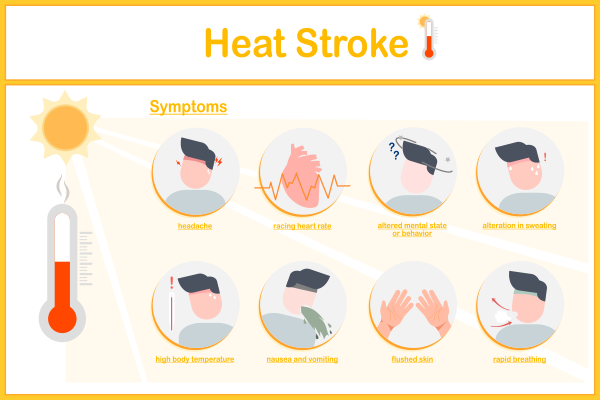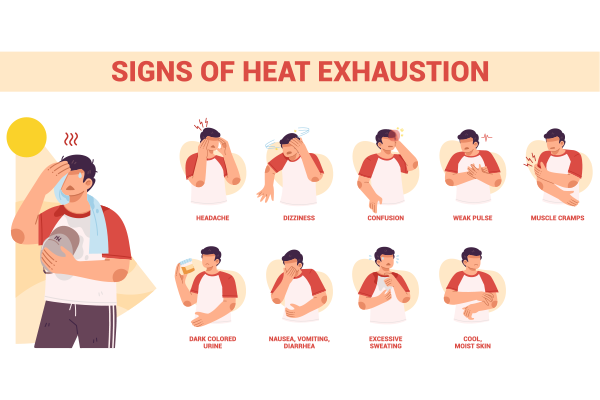
Did you know that extreme heat kills more people in the U.S. than any other weather-related event, including floods and hurricanes? According to the Centres for Disease Control and Prevention (CDC), each year, heat-related illnesses contribute to thousands of emergency room visits and hospitalisations. As temperatures rise, so does the risk of heat-related illness (HRI), which can manifest as heat exhaustion, heat stroke, heat cramps, and dehydration. Recognising the symptoms early, providing immediate first aid, and taking proactive measures to prevent heat-related illness are key to safeguarding your health and well-being.
This blog will guide you through the symptoms, first-aid protocols, and preventive strategies for heat-related illness while also providing insights into specific population groups at risk and the impact of climate change.
Synopsis
- Understanding Heat-Related Illnesses
- Dehydration: The Root Cause of Heat-Related Illnesses
- Heat Safety Tips for Specific Populations
- First Aid for Heat-Related Conditions
- Impact of Climate Change on Heat-Related Illnesses
- Hydration and Nutrition for Heat Safety
- Exercise and Heat: Guidelines for Safe Physical Activity
- Local Climate Awareness: Heat Patterns in Jaipur
- Long-Term Effects of Heat-Related Illnesses
- Conclusion
Understanding Heat-Related Illnesses
Heat-related illness symptoms can range from mild conditions like heat cramps to life-threatening emergencies like heat stroke. It’s crucial to recognise the heat illnesses early to avoid long-term complications. Here's a breakdown of the main types of heat-related illnesses:
|
Heat-Related Illness |
Symptoms |
Severity |
|
Heat Cramps |
Painful muscle cramps, heavy sweating |
Mild |
|
Heat Exhaustion |
Heavy sweating, dizziness, nausea, fatigue |
Moderate |
|
Heat Stroke |
Body temperature above 104°F, confusion, delirium |
Severe, life-threatening |
While heat exhaustion and heat cramps can often be treated effectively with hydration and cooling, heat stroke requires immediate medical attention to prevent serious complications, including organ failure and death.
Dehydration: The Root Cause of Heat-Related Illnesses
Dehydration is often the precursor to heat-related illnesses. When your body loses too much water or electrolytes, it can’t function properly, leading to heat exhaustion or heat stroke. Here are the signs of dehydration and strategies to prevent it:
|
Signs of Dehydration |
Prevention Tips |
|
Thirst |
Drink water regularly, even without thirst |
|
Dry mouth and skin |
Hydrate with water and electrolyte-rich drinks |
|
Dark-colored urine |
Consume more fluids, especially during outdoor activity |
|
Fatigue or dizziness |
Take breaks in cool environments and hydrate |
Heat Safety Tips for Specific Populations
Certain groups are more vulnerable to heat-related illnesses. Below are heat safety tips tailored for these groups:
Children:
-
Ensure they drink water frequently, especially during outdoor play.
-
Avoid peak heat hours (11 a.m.–4 p.m.).
-
Dress them in lightweight, breathable clothing.
The Elderly:
-
Monitor for symptoms like dizziness and confusion, which are common in older adults.
-
Encourage regular hydration and the use of fans or air conditioning.
-
Check in regularly during heat waves.
Individuals with Chronic Illnesses:
-
Certain medical conditions (e.g., heart disease, diabetes) can make heat regulation harder.
-
Stay indoors during extreme heat and avoid physical exertion.
-
Consult a doctor about appropriate medications and hydration needs.
First Aid for Heat-Related Conditions

Effective first aid can make the difference between a quick recovery and severe health complications. Here's how to handle common heat illnesses:
For Heat Cramps:
-
Move the person to a cool place.
-
Hydrate with water or an electrolyte drink.
-
Gently stretch and massage the affected muscles.
For Heat Exhaustion:
-
Get the person into a cooler environment.
-
Have them rest and hydrate.
-
Apply cool compresses or a damp cloth to their skin.
-
Elevate their legs to improve circulation.
For Heat Stroke:
-
Call 911 immediately.
-
Move the person to a shaded, cool area.
-
Cool their body by applying ice packs or immersing them in cool water.
-
Do not give them fluids if they are unconscious or semi-conscious.
Impact of Climate Change on Heat-Related Illnesses

As global temperatures rise due to climate change, the frequency and intensity of heat waves are increasing. This means that heat-related illnesses are becoming more common, and vulnerable populations are at higher risk. Some areas that historically experienced mild summers are now facing more intense heat events, leading to increased emergency room visits for heat exhaustion and heat stroke.
The rise in temperatures also exacerbates urban heat islands, where concrete and asphalt trap heat, making it harder for individuals to find cool refuge. Communities in these areas need to adapt by creating more green spaces and enhancing cooling systems.
Hydration and Nutrition for Heat Safety
Proper hydration is crucial in preventing heat-related illness. Here are some hydration tips tailored for different activities
|
Activity |
Hydration Tips |
|
Outdoor Work |
Drink water every 15-20 minutes |
|
Physical Exercise |
Use water and electrolyte drinks to replenish lost fluids |
|
Leisure Activities |
Drink water before, during, and after exposure to heat |
Foods that help keep your body cool include those with high water content, such as watermelon, cucumbers, and strawberries. Salty snacks can also help replenish electrolytes lost through sweating.
Exercise and Heat: Guidelines for Safe Physical Activity
Exercising in extreme heat poses significant risks. Follow these guidelines to avoid heat-related illness while staying active:
-
Exercise early or late: Aim to exercise in the cooler hours of the day.
-
Start slow: Gradually increase your intensity to help your body acclimatise to heat.
-
Listen to your body: If you experience dizziness, nausea, or muscle cramps, stop and rest in a cool place.
Local Climate Awareness: Heat Patterns in Jaipur
In Jaipur, temperatures can soar above 40°C during the summer months, creating a significant risk for heat-related illnesses. The urban heat island effect, combined with high humidity levels, makes it particularly challenging for residents to stay cool. Ensuring the availability of shaded public spaces, encouraging hydration, and advising against outdoor physical exertion during peak heat hours are critical to improving heat safety.
Long-Term Effects of Heat-Related Illnesses
Severe heat-related illnesses like heat stroke can cause long-term health complications, such as:
-
Neurological damage: Extended exposure to extreme heat can cause permanent brain damage.
-
Kidney damage: Severe dehydration and heat stroke can result in kidney failure.
-
Heat intolerance: Recurrent heat illnesses may lead to chronic heat intolerance, making it difficult to withstand heat in the future.
Conclusion
With the rising threat of heat-related illnesses, it’s crucial to stay informed about the symptoms, first-aid protocols, and prevention strategies. Recognising the early signs of heat exhaustion, heat stroke, and other heat illnesses can make all the difference in preventing long-term health complications.
If you or a loved one experiences severe symptoms of heat stroke or any heat-related illness, seeking immediate medical attention is vital. Manipal Hospital Jaipur, a leading healthcare provider in the region, is equipped with state-of-the-art facilities and expert medical professionals who specialise in treating heat-related emergencies. Whether it’s providing immediate care for heat stroke or offering preventative measures and hydration therapy, Manipal Hospital Jaipur ensures that you receive the highest quality care.
Remember, preventing heat-related illness starts with being proactive about hydration, staying cool, and recognising symptoms early. For any concerns or emergencies, trust Manipal Hospital Jaipur to provide comprehensive and compassionate care, keeping you and your family safe during extreme heat conditions.
Stay safe, stay hydrated, and don’t hesitate to reach out to Manipal Hospital Jaipur for expert medical support when you need it most.
By understanding the risks and taking proactive steps to prevent heat-related illness, you can protect yourself and others from the harmful effects of extreme heat. Stay safe and hydrated—your health depends on it!
FAQ's
Heat exhaustion is milder, with symptoms like sweating and dizziness, while heat stroke is a medical emergency, marked by a high body temperature, confusion, and unconsciousness.
Early symptoms include heavy sweating, dizziness, nausea, fatigue, and muscle cramps. If you or someone else experiences these, take immediate steps to cool down and hydrate.
Move them to a cool environment, hydrate with water, and apply cool compresses. If symptoms worsen, seek medical help immediately.
Children, the elderly, athletes, and individuals with chronic medical conditions are at a higher risk due to their limited ability to regulate body temperature.
Untreated heat stroke can lead to permanent neurological damage, organ failure, and heat intolerance, significantly impacting one's ability to endure heat in the future.





















 7 Min Read
7 Min Read













